
Billionaire Howard Lutnick to divest corporate holdings to assume commerce secretary post, documents show
CBSN
Howard Lutnick, the billionaire financial executive named by President Trump to head the Commerce Department, has agreed to divest his holdings in a range of business interests, including stepping down from his longstanding position as head of the brokerage and investment bank Cantor Fitzgerald.
Lutnick also agreed to step down from his position with the global brokerage and financial technology company BGC Group, Inc., which holds sizeable government contracts, and he has agreed to depart as chairman of Newmark Group, Inc., a commercial real estate firm, according to an ethics filing obtained by CBS News.
That document and a 92-page financial disclosure report Lutnick filed late Wednesday offer a glimpse into considerable challenges of divestiture facing the long list of super-wealthy executives who have sought positions in the incoming Trump administrations.
